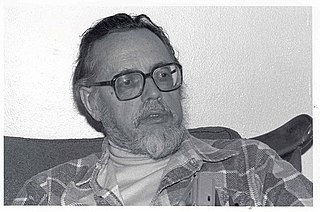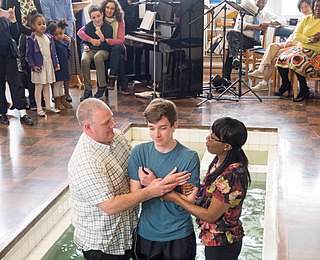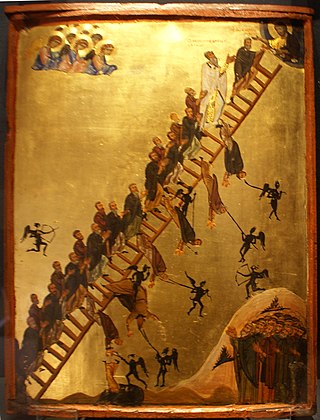
The Gospel of Mark is the second of the four canonical gospels and one of the three synoptic Gospels. It tells of the ministry of Jesus from his baptism by John the Baptist to his death, the burial of his body, and the discovery of his empty tomb. It portrays Jesus as a teacher, an exorcist, a healer, and a miracle worker, though it does not mention a miraculous birth or divine pre-existence. He refers to himself as the Son of Man. He is called the Son of God but keeps his messianic nature secret; even his disciples fail to understand him. All this is in keeping with the Christian interpretation of prophecy, which is believed to foretell the fate of the messiah as suffering servant.

The Gospel of Matthew is the first book of the New Testament of the Bible and one of the three synoptic Gospels. It tells how Israel's Messiah, Jesus, comes to his people but is rejected by them and how, after his resurrection, he sends the disciples to the gentiles instead. Matthew wishes to emphasize that the Jewish tradition should not be lost in a church that was increasingly becoming gentile. The gospel reflects the struggles and conflicts between the evangelist's community and the other Jews, particularly with its sharp criticism of the scribes and Pharisees with the position that through their rejection of Christ, the Kingdom of God has been taken away from them and given instead to the church.

The Gospel of John is the fourth of the four canonical gospels in the New Testament. It contains a highly schematic account of the ministry of Jesus, with seven "signs" culminating in the raising of Lazarus and seven "I am" discourses culminating in Thomas' proclamation of the risen Jesus as "my Lord and my God". The gospel's concluding verses set out its purpose, "that you may believe that Jesus is the Christ, the Son of God, and that believing you may have life in his name."

The Rapture is an eschatological position held by some Christians, particularly those of American evangelicalism, consisting of an end-time event when all dead Christian believers will be resurrected and, joined with Christians who are still alive, together will rise "in the clouds, to meet the Lord in the air."
The Christological argument for the existence of God, which exists in several forms, holds that if certain claims about Jesus are valid, one should accept that God exists. There are three main threads; the argument from the wisdom of Jesus, the argument from the claims of Jesus as son of God and the argument from the resurrection.
Premillennialism, in Christian eschatology, is the belief that Jesus will physically return to the Earth before the Millennium, heralding a literal thousand-year messianic age of peace. Premillennialism is based upon a literal interpretation of Revelation 20:1–6 in the New Testament, which describes Jesus's reign in a period of a thousand years.

In Christianity, Jesus is believed to be the Son of God as chronicled in the Bible's New Testament, and in most Christian denominations he is held to be God the Son, a prosopon (Person) of the Trinity of God.
The concept of the kingship of God appears in all Abrahamic religions, where in some cases the terms kingdom of God and kingdom of Heaven are also used. The notion of God's kingship goes back to the Hebrew Bible, which refers to "his kingdom" but does not include the term "Kingdom of God".

Jesus, also referred to as Jesus Christ, Jesus of Nazareth, and many other names and titles, was a first-century Jewish preacher and religious leader. He is the central figure of Christianity, the world's largest religion. Most Christians believe Jesus to be the incarnation of God the Son and the awaited messiah, the Christ that is prophesied in the Old Testament.

John Howard Yoder was an American Mennonite theologian and ethicist best known for his defense of Christian pacifism. His most influential book was The Politics of Jesus, which was first published in 1972. Yoder was a Mennonite and wrote from an Anabaptist perspective. He spent the latter part of his career teaching at the University of Notre Dame.
Neo-Calvinism, a form of Dutch Calvinism, is a theological movement initiated by the theologian and former Dutch prime minister Abraham Kuyper. James Bratt has identified a number of different types of Dutch Calvinism: The Seceders, split into the Reformed Church "West" and the Confessionalists; the neo-Calvinists; and the Positives and the Antithetical Calvinists. The Seceders were largely infralapsarian and the neo-Calvinists usually supralapsarian.
Realized eschatology is a Christian eschatological theory popularised by J.A.T. Robinson, Joachim Jeremias, Ethelbert Stauffer, and C. H. Dodd (1884–1973) that holds that the eschatological passages in the New Testament do not refer to the future, but instead refer to the ministry of Jesus and his lasting legacy. Eschatology is therefore not the end of the world but its rebirth instituted by Jesus and continued by his disciples, a historical phenomenon. Those holding this view generally dismiss eschatology theories, believing them to be irrelevant; they hold that what Jesus said and did, and told his disciples to do likewise, are of greater significance than any messianic expectations. Realized eschatology is contrasted with consistent eschatology. The two concepts have been combined in inaugurated eschatology.
George Eldon Ladd was a Baptist minister and professor of New Testament exegesis and theology at Fuller Theological Seminary in Pasadena, California, known in Christian eschatology for his promotion of inaugurated eschatology and "futuristic post-tribulationism."

Inaugurated eschatology is the belief in Christian theology that the end times were inaugurated in the life, death and resurrection of Jesus, and thus there are both "already" and "not yet" aspects to the Kingdom of God. George Eldon Ladd suggests that the Kingdom of God is "not only an eschatological gift belonging to the Age to Come; it is also a gift to be received in the old aeon."

Christianity in the 1st century covers the formative history of Christianity from the start of the ministry of Jesus to the death of the last of the Twelve Apostles and is thus also known as the Apostolic Age. Early Christianity developed out of the eschatological ministry of Jesus. Subsequent to Jesus' death, his earliest followers formed an apocalyptic messianic Jewish sect during the late Second Temple period of the 1st century. Initially believing that Jesus' resurrection was the start of the end time, their beliefs soon changed in the expected Second Coming of Jesus and the start of God's Kingdom at a later point in time.

Believer's baptism or adult baptism is the practice of baptizing those who are able to make a conscious profession of faith, as contrasted to the practice of baptizing infants. Credobaptists believe that infants incapable of consciously believing should not be baptized.

Eternal life traditionally refers to continued life after death, as outlined in Christian eschatology. The Apostles' Creed testifies: "I believe... the resurrection of the body, and life everlasting." In this view, eternal life commences after the second coming of Jesus and the resurrection of the dead, although in the New Testament's Johannine literature there are references to eternal life commencing in the earthly life of the believer, possibly indicating an inaugurated eschatology.

The Kingdom of God is one of the key elements of the teachings of Jesus in the New Testament. Drawing on Old Testament teachings, the Christian characterization of the relationship between God and humanity inherently involves the notion of the Kingship of God. The Old Testament refers to "God the Judge of all" and the notion that all humans will eventually "be judged" is an essential element of Christian teachings. Building on a number of New Testament passages, the Nicene Creed indicates that the task of judgment is assigned to Jesus.
Marianne Meye Thompson is an American theologian, currently the George Eldon Ladd Professor of New Testament at Fuller Theological Seminary.
Consistent eschatology is a theory in theological and biblical studies that interprets Jesus "in exclusively eschatological terms". The view was initiated by Johannes Weiss, and "picked up, developed, and popularized" by Albert Schweitzer. It is an exclusive futuristic eschatology, the consistent interpretation of Jesus' eschatology as an expectation of an imminent end, and the thorough-going eschatology, the first position by Albert Schweitzer. He used a thorough eschatology to provide a solution to the historical problems associated with Jesus' life. According to this view, asserted by Johannes Weiss, the proclamation of Jesus, his actions and ministry are dominated by the eschatological expectation of the impending return.











